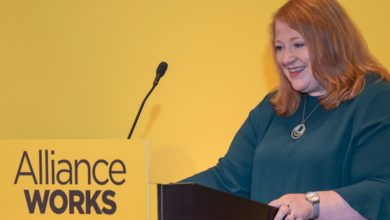The first committee Bill
 The Northern Ireland Public Services Ombudsperson Bill will soon become the first piece of legislation to be taken forward by an Assembly committee. agendaNi examines its proposed content.
The Northern Ireland Public Services Ombudsperson Bill will soon become the first piece of legislation to be taken forward by an Assembly committee. agendaNi examines its proposed content.
Committees make an important contribution to improving Assembly legislation but, until now, none have drafted and taken forward a Bill on their own initiative. The Northern Ireland Public Service Ombudsperson Bill is currently being finalised and is due to be introduced by the OFMDFM Committee in the coming months.
If passed, the legislation will streamline the office of the Ombudsman and also strengthen its ability to investigate complaints on behalf of the public. A total of 972 complaints were received during 2013-2014.
The position originated in Scandinavia and the word broadly translates as representative or proxy. Britain’s first Ombudsman was appointed in 1967 and the same office was established in Northern Ireland two years later with a remit that covered government departments. An additional post (Commissioner for Complaints) was established in 1996 to cover other public bodies.
In practice, the two roles have always been held by the same person. The incumbent, Tom Frawley, was appointed in 2000 after a long career in the Health Service. A review of the structures was carried out by Deloitte in 2004 and proposed a single office: the Northern Ireland Public Services Ombudsman.
The direct rule administration wanted to defer a decision until devolution returned. The official response to the review was the responsibility of OFMDFM ministers from May 2007 onwards. However, OFMDFM said that it would not deal with the issue due to “competing priorities” and Tom Frawley therefore asked the OFMDFM Committee to take this forward.
A public consultation was carried out in 2010 and the issue was referred to the new OFMDFM Committee formed after the May 2011 Assembly election. A further consultation followed in 2012 and the committee’s final report was published in September 2013. A Bill is now in its final stages of drafting but has not yet been published. It will be known as the Northern Ireland Public Services Ombudsperson Bill – to ensure gender-neutral language – with the position abbreviated to NIPSO. It is, though, likely that most members of the public will still describe the post as the Ombudsman.
Proposals
The committee’s report proposed that the NIPSO would be recruited by the Assembly Commission and formally appointed by the Queen for a single seven-year term. The NIPSO would therefore have a similar relationship to the Assembly as the Auditor General and would be held to account by an Assembly committee for his or her budget.
The remit would be wider than the current Ombudsman and would take in schools, further and higher education institutions, the Assembly Commission, and the Audit Office. The NIPSO would be able to look at complaints relating to public procurement and professional judgment in social care but not public sector employment issues.
He or she would be able to take oral complaints – provided that these are then transcribed into a written record and agreed within 20 working days. A complaint could be made by an individual in person, a representative acting on their behalf, or their MLA.
The requirement that the complainant should be resident in Northern Ireland will be removed and the NIPSO would also be able to start an investigation on his or her own initiative. In addition, public bodies would be able to refer complaints to the NIPSO for determination when they have been unable to resolve an issue.
The time limit for making a complaint would be reduced from 12 months to six months. The starting point for that time limit will also be changed from the time at which a complainant became aware of the event to the date of the final decision of the public body’s complaints procedure – this will ensure that the Ombudsman is only approached when other routes have been exhausted.
Upheld complaints could be used as a basis for seeking damages at the county court – subject to the right of a fair trial – and the NIPSO could ask the Attorney General to seek a High Court order where a public body is “likely to persist in maladministration.” Public bodies would also be obliged to disclose relevant legal advice, again subject to the right to a fair trial.
The NIPSO’s access to information will be limited by a ministerial veto. The Secretary of State and/or an Executive Minister would be able to prohibit disclosure where this is considered contrary to the public interest or prejudicial to national security.
The committee is also considering a proposal to allow the NIPSO to hold office as the Northern Ireland Judicial Appointments Ombudsman. The latter position was established in 2006 and is currently held by Karamjit Singh. It was set up as the post already existed in England and Wales but it only occasionally receives complaints.
Initiative
This is the first time that an Assembly committee has brought forward a Bill on its own initiative. The process is identical to that for ministerial or private members’ bills and the Assembly has the discretion to accelerate its passage and therefore bypass the committee stage.
The committee’s Chairman (currently Mike Nesbitt) will introduce the Bill and take questions on its content during debates. Nesbitt has said that the Bill is a “very clear demonstration of how committees play a key role in making legislation which will benefit the public.”
The long lead-in time for the Bill partly reflects the detailed nature of its contents, its relatively low political priority, and the need to establish consensus among the five parties on the committee. However, Northern Ireland’s reform process in this area has been much slower than elsewhere. The Scottish Parliament passed legislation to strengthen the powers of its ombudsman in 2002 and the Welsh Assembly followed suit three years later.
A date for introducing the Bill has not yet been announced but the committee hopes to bring it forward before the summer recess. The aim is therefore to pass the legislation before the Assembly election in May 2016.
Committee members
Chair: Mike Nesbitt (UUP)
Deputy Chair: Chris Lyttle (All)
Alex Attwood (SDLP)
Michael Copeland (UUP)
Megan Fearon (SF)
Brenda Hale (DUP)
Bronwyn McGahan (SF)
David McIlveen (DUP)
Alex Maskey (SF)
Stephen Moutray (DUP)
Jimmy Spratt (DUP)





